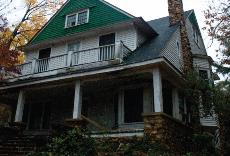The proposed high-density development of a property directly behind Guilford’s football stadium has raised questions about campus housing, environmental, and urban development issues amongst residents of the neighborhood, students, faculty, staff, and the college’s administration. Though the Greensboro Zoning Commission denied the rezoning application in a five-to-four vote during their Nov. 12 meeting, developer Randall Dixon has appealed and is still fighting to build apartments at 811 Dolly Madison Road.The property’s location drew support from Guilford’s administration and opposition from students, staff and faculty. It is situated in a low-density neighborhood, a fact that nearly all of the neighbors on Dolly Madison and Foxwood Drive took issue with.
“The zoning request is neither consistent nor compatible with the existing single-family residential housing,” said Pamela Robertson, a resident of Foxwood Drive, during the Zoning Commission meeting. “The requested rezoning will undoubtedly cause drastic and lasting changes to the neighborhood.”
The proposed development would take place on a 3.4-acre plot of land situated on Dolly Madison on the north side of W. Friendly Avenue. The plot sits between the Hildebrant art studio and the Guilford football stadium and extends to the northeast. The property is owned by John Hodgins, a longtime Greensboro resident who currently lives in Friends Homes. Dixon outlined his development plans for the land he has contracted to buy should the rezoning proposal go through.
“We plan to build a small residential, student apartment complex,” Dixon said during the Commission meeting. “There will be several buildings with a total of 48 units, each one housing 3-bedroom, 3-bathroom apartments. The buildings will all be constructed 140 feet off of Dolly Madison.”
“Guilford is not in a position right now to add housing. So this becomes a real positive in trying to keep students here near campus,” said Jonathan Varnell, associate vice president of operations and facilities for the college and Guilford’s representative at the Council meeting. “There are a lot of positives to the land being developed.”
Other proposed changes to the property include adding a lighted walking and biking path to the college, potentially connecting Dolly Madison to George White Road, and expanding a portion of Dolly Madison to handle the increased traffic.
Dixon asserted during the meeting that he had been very transparent with his intentions throughout the planning process. Varnell affirmed Dixon’s claim.
“Randy Dixon contacted the school, like he did the other neighbors,” said Varnell. “I sat down with him along with Vic Cochran, the vice chairman of the board of trustees. The three of us met, and Dixon showed us his plans and we talked through them.”
The neighbors did not, on the other hand, feel that Dixon had been transparent and open.
“There was never a time when the property was posted for sale and we were never directly notified about the development plans,” said Les McCaskill, Foxwood Drive resident and husband of Pamela Robertson. “We were told by our neighbor, Gary Neustel. He was the only one in the neighborhood to receive a notice of the rezoning meeting.”
Greensboro regulations require zoning notices to be sent to houses within 150 feet of the property line of the proposed development.
Other neighbors had similar experiences to McCaskill’s. Guilford junior and Foxwood Drive resident Gabriella Spang found out from her neighbor Jim Newlin, who had also learned of the development plans from Neustel.
Spang joined the fight against the development both to support her neighbors and because she sees this as a microcosm of greater land rights issues. She gathered 115 signatures from Guilford students and faculty in opposition.
“My experience with political science, peace and conflict studies, and environmental studies has exposed me to a lot of information about land rights conflicts around the world,” said Spang. “Though this is smaller, it feels similar.”
Other students voiced strong opposition to the development.
Sophomore Katrina Siladi, president of Forevergreen, was one of the seven Guilford students who attended the Commission meeting.
“I’m opposed to the idea that progress equals more apartment buildings on top of beautiful, historic woods,” said Siladi.
Dixon says that their development plan will leave 1.3 acres undisturbed and leave as many of the existing trees on the property as they can.
“Given the density he’s planning to construct, and given the requirements he has for parking and just to get the job done, I’m sure he doesn’t intend to clear-cut the property,” said Robertson “But, the practical result is that he isn’t going to be able to construct what he wants to construct without taking down nearly every tree on that property.”
Guilford has decided to support Dixon in his development efforts. The combination of needing to provide more accessible student housing and their belief that development is imminent on the property have weighed into their decision.
“If the property stays woods we’re cool with that,” said Varnell. “But, we’re pretty convinced, based on a lot of different experience, that that property is going to be developed. In that case, we want to have a lot of say about that. That’s why we decided to affirm what Dixon has agreed to do, because the guy really has been outstanding. He has acquiesced to our requests.”
“Guilford’s always been, by virtue of the Quaker side of the school, a very positive force in the community,” said McCaskill. “The lack of support now, just indicates a change that I’m somewhat bewildered by.”
Dixon’s appeal case goes before the Zoning Commission on Dec. 18. The meeting will be held in the City Council Chamber in the Melvin Municipal Office Building, 300 West Washington Street. The meeting starts at 2:00 p.m. and is open to the public.

